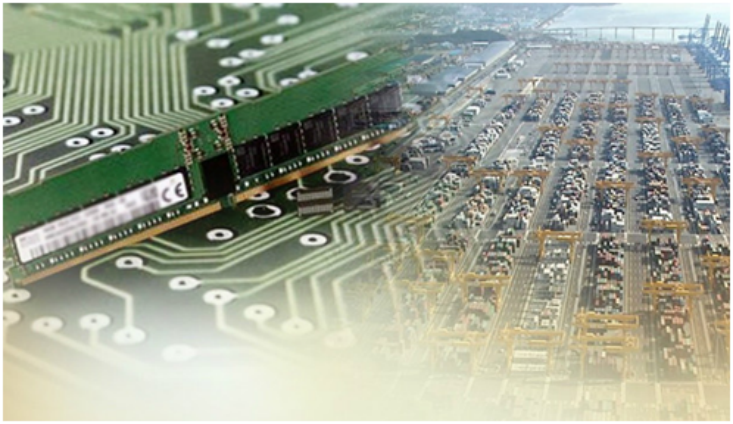Korean media: South Korea’s semiconductor industry is still overly dependent on Japan
Dec 07,2021

"The Korea Institute for International Economic Policy (Korea Institute for International Economic Policy) pointed out in its recent report that for Korean industrial products that are highly dependent on Japan, more thorough supply chain risk management is required, and in-source technology development and supply chain management are required. Make longer-term efforts in diversification.
According to a businesskorea report, last year, South Korea’s semiconductor exports totaled US$95.46 billion, of which mainland China accounted for 43.2%, followed by Hong Kong (18.3%), Vietnam (9.6%), the United States (7.9%) and Taiwan (7.1%) .
Memory chips accounted for 62% of the total semiconductor exports, at 59.2 billion U.S. dollars, and mainland China and Hong Kong, China accounted for 50.3% and 21%, respectively.
The institute stated: “Korean semiconductor companies produce products in mainland China and provide products to mainland China and multinational companies in China. However, as the United States exerts pressure on mainland China in the semiconductor industry, this business model may be increasingly affected. Big impact.""
It is understood that South Korea’s semiconductor imports last year were 57.03 billion U.S. dollars, and imports from China, Taiwan, Japan, the United States and Singapore accounted for 31.2%, 20.4%, 13.6%, 11% and 6.5% of total imports, respectively. System chip imports accounted for 39.1% of total imports, followed by memory chips (31.7%), semiconductor equipment (13.5%) and equipment components (5.3%).
Imports of semiconductor equipment from Japan were US$3.02 billion, followed by the United States (US$1.69 billion) and Singapore (US$1.53 billion). Semiconductor materials imported from Japan accounted for 38.5% of total imports, followed by China (20.5%), the United States (11.3%), Taiwan, China (8.3%) and Vietnam (4.1%).
At the same time, South Korea has shown a high dependence on Japan in certain projects, such as fluoropolyimide (93.8%), photoresist (86.5%) and silicon wafers (56.6%). In addition, South Korea imports about 74% of hydrogen fluoride from Japanese companies. The institute warned that high dependence may lead to serious risks.
In addition, the institute pointed out that the United States and its allies have strengthened cooperation in an attempt to isolate mainland China in the semiconductor field. Japan and Taiwan are also expanding cooperation. If cooperation is further deepened, South Korean semiconductor companies may also fall into crisis.
""Japan is likely to continue to monitor South Korea's semiconductor industry. The semiconductor alliance of the United States, Japan, and Taiwan will become a challenge. In addition to supply chain management and technology development, more diplomatic efforts are needed,"" the institute added."
According to a businesskorea report, last year, South Korea’s semiconductor exports totaled US$95.46 billion, of which mainland China accounted for 43.2%, followed by Hong Kong (18.3%), Vietnam (9.6%), the United States (7.9%) and Taiwan (7.1%) .
Memory chips accounted for 62% of the total semiconductor exports, at 59.2 billion U.S. dollars, and mainland China and Hong Kong, China accounted for 50.3% and 21%, respectively.
The institute stated: “Korean semiconductor companies produce products in mainland China and provide products to mainland China and multinational companies in China. However, as the United States exerts pressure on mainland China in the semiconductor industry, this business model may be increasingly affected. Big impact.""
It is understood that South Korea’s semiconductor imports last year were 57.03 billion U.S. dollars, and imports from China, Taiwan, Japan, the United States and Singapore accounted for 31.2%, 20.4%, 13.6%, 11% and 6.5% of total imports, respectively. System chip imports accounted for 39.1% of total imports, followed by memory chips (31.7%), semiconductor equipment (13.5%) and equipment components (5.3%).
Imports of semiconductor equipment from Japan were US$3.02 billion, followed by the United States (US$1.69 billion) and Singapore (US$1.53 billion). Semiconductor materials imported from Japan accounted for 38.5% of total imports, followed by China (20.5%), the United States (11.3%), Taiwan, China (8.3%) and Vietnam (4.1%).
At the same time, South Korea has shown a high dependence on Japan in certain projects, such as fluoropolyimide (93.8%), photoresist (86.5%) and silicon wafers (56.6%). In addition, South Korea imports about 74% of hydrogen fluoride from Japanese companies. The institute warned that high dependence may lead to serious risks.
In addition, the institute pointed out that the United States and its allies have strengthened cooperation in an attempt to isolate mainland China in the semiconductor field. Japan and Taiwan are also expanding cooperation. If cooperation is further deepened, South Korean semiconductor companies may also fall into crisis.
""Japan is likely to continue to monitor South Korea's semiconductor industry. The semiconductor alliance of the United States, Japan, and Taiwan will become a challenge. In addition to supply chain management and technology development, more diplomatic efforts are needed,"" the institute added."
